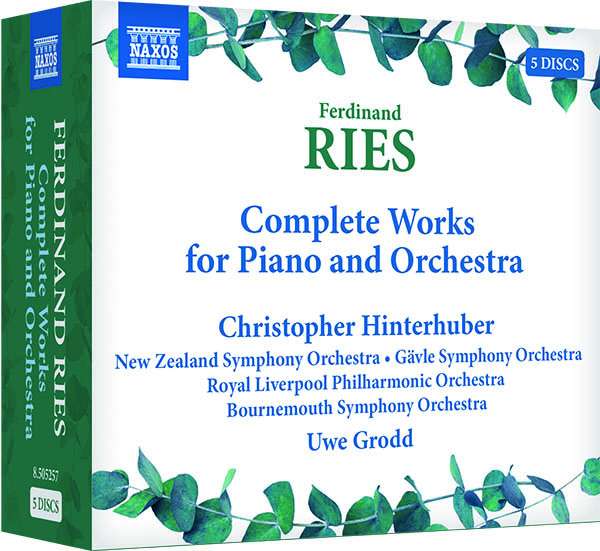Wir veröffentlichen nachstehend die Rezensionen, die bei der Erstveröffentlichung der Einzel-CDs in der Pizzicato-Druckausgabe erschienen.
Klavierkonzerte op. 151 u, 123; Christopher Hinterhuber, Klavier, New Zealand Symphony Orchestra, Uwe Grodd (60’57) – Rezension von Remy Franck
Die acht Klavierkonzerte des Beethoven-Schülers, -Vertrauten und -Biographen Ferdinand Ries gelten neben jenen von Hummel als die wichtigsten Werke dieser Gattung im frühen 19. Jahrhundert. Sie fallen einerseits durch ihren lyrischen Charakter auf, andererseits durch ein Brio und eine Kraft, die durchaus an Beethoven erinnern.
Naxos beginnt die Gesamtaufnahme dieser Konzerte mit der Weltersteinspielung der Konzerte op. 151 (Gruß an den Rhein) und 123. Sie entstanden 1826 und 1806, also im Abstand von 20 Jahren und gewähren somit einen guten Einblick in die künstlerische Entwicklung von Ferdinand Ries.
In dem jungen Pianisten Christopher Hinterhuber finden sie einen hoch motivierten Interpreten, der die Ecksätze forsch und kraftvoll angeht und als engagierter Anwalt dieser Musik in ihr ein Feuer der ungezügelten Leidenschaft entzündet. In den beiden Larghettos kann er aber auch sehr viel Charme zum Ausdruck bringen. Begleitet wird er von einem inspiriert musizierenden New Zealand Symphony Orchestra unter der Leitung von Uwe Grodd.
Klavierkonzert Nr. 3 op. 55 + Schwedische Nationalweisen mit Variationen op. 52 + Introduktion und Polonaise op. 174; Christoph Hinterhuber, Gävle Symphony Orchestra, Uwe Grodd (60’27) – Rezension von Remy Franck
Nach den drei Stücken zu urteilen, die auf dieser CD zu hören sind, muss der von Ludwig van Beethoven ausgebildete Ferdinand Ries (1784-1838) ein temperamentvoller Mensch gewesen sein. Die Musik ist sehr oft nicht nur virtuos – der Komponist mag da ganz für den brillanten Pianisten Ries geschrieben haben – sondern regelrecht lustig und keck. Diesen Eindruck vermitteln zumindest die Interpretationen von Christoph Hinterhuber und dem Symphonieorchester aus Gävle unter der zupackenden Leitung von Uwe Grodd.
Neben dem 3. Klavierkonzert, in dem der Beethoven-Schüler nicht nur zeigt, dass er etwas beim Meister gelernt hat, sondern, dass er es auch sehr persönlich anwenden kann, erklingen die Stücke ‘Introduktion und Polonaise’ op. 174 und die ‘Schwedischen Nationalweisen mit Variationen’ op. 52. Pathos (der bei weniger inspirierten Interpreten unausweichlich gewesen wäre) kommt bei so viel Elan nicht auf, und das ist auch gut so. Hinterhuber ist aber nicht nur an der Virtuosität und deren Kommunikation interessiert, sondern an einem echten Dialog mit dem Orchester. Dabei ist sein Spiel immer klar und transparent und bleibt auch in Forte-Passagen klangschön.
Die exzellente Klangqualität der Aufnahme an sich sollte auch noch hervorgehoben werden. Daher: eine rundum empfehlenswerte Produktion!
Klavierkonzert op. 132 + Grand Variations on ‘Rule Britannia’; Christopher Hinterhuber, Klavier, Royal Liverpool Philharmonic Orchestra, Uwe Grodd (66’02) – Rezension von Guy Engels
England war im 18. und 19. Jahrhundert eine Art gelobtes Land für Musiker. Viele namhafte Komponisten hatten ihren Auftritt in London, ließen ihre Werke von englischen Verlegern veröffentlichen. Auch Ludwig van Beethovens Freund aus Bonner Zeiten, Ferdinand Ries, hatte es für zehn Jahre in die Hauptstadt des Empire verschlagen. Zu seinem Abschied komponierte er sein Klavierkonzert in a-Moll op. 132. Seit jeher muss Ferdinand Ries mit dem Vorurteil leben, ein Epigone Beethovens zu sein. Es ist nicht zu leugnen, dass sich in seiner Musik Anklänge an den Freund wiederfinden, dennoch hat Ries zu einer eigenen Musiksprache gefunden.
Der Österreicher Christopher Hinterhuber hat es sich zum Ziel gesetzt, den großen Pianisten Ferdinand Ries auch als Komponist ins rechte Licht zu rücken. Das gelingt ihm durchaus mit der 3. Folge der Gesamteinspielung der Klavierkonzerte.
Das Klavierkonzert op. 132 ist von klassischer Faktur, und Christopher Hinterhuber spielt es sehr ausgewogen in der Phrasierung, in feiner, klarer Tönung. Er verzichtet auf jegliche Kraftmeierei auf den Tasten, setzt stattdessen auf gefühlvolles Aussingen. Sehr schön ist ihm in dieser Hinsicht der zweite Satz gelungen, ein Gedicht, streichzart begleitet von den Geigen.
Das Orchester aus Liverpool folgt dem Solisten in seinem interpretatorischen Ansatz. Vor allem in den Variationen über Rule Britannia lässt es sich nicht zu musikalischem Patriotismus verleiten, zu pompösen Klängen, wie sie Elgar und seine Zeitgenossen komponiert haben.
Concerto Pastoral op. 120 + Klavierkonzert op. 115 + Introduction et Rondeau Brillant WoO54 (71’26) – Rezension von Remy Franck
Christoph Hinterhuber setzt seine Gesamteinspielung der Ries-Konzerte fort mit zwei wirklich prächtigen Konzerten, die er, wie jene zuvor, hoch motiviert angeht, voller Tatendrang, mit pianistischer Leidenschaft, forsch und kraftvoll in den schnellen Ecksätze, mit unwiderstehlichem Charme in den langsamen Mittelsätzen. Begleitet wird er von einem inspiriert musizierenden Bournemouth Symphony Orchestra unter der Leitung von Uwe Grodd. Das klingt alles so souverän, dass man glaubt, Solist und Orchester würden diese Stücke alle paar Wochen einmal spielen.
Klavierkonzerte op. 42 & op. 177 + Introduction et Rondeau Brillant; Christopher Hinterhuber, Klavier, New Zealand Symphony Orchestra, Uwe Grodd (78’06) – Rezension von Guy Engels
Der Pianist Christoph Hinterhuber ist am Ziel angekommen. Er hat sämtliche Klavierwerke mit Orchester von Ferdinand Ries eingespielt. Auf der fünften und letzten CD hören wir die Concerti op. 42 in Es-Dur, op. 177 in g-Moll sowie das Rondeau brillant op. 144. In seiner zupackenden Art erweist sich Christopher Hinterhuber einmal mehr als kompetenter Anwalt des Beethoven-Verehrers, der in seinen Werken allerdings einen sehr persönlichen Klang entwickelt. Hinterhuber spielt brillant, mit süffigem Forte oder samtweichem Anschlag in den stillen Passagen. Er kann sich dabei vollends auf das ‘New Zealand Symphony Orchestra’ und Uwe Grodd verlassen, die dem Pianisten mit rundem und kompaktem Klang zur Seite stehen.
We publish below the reviews that appeared on the first release of the individual CDs in the Pizzicato print edition.
Piano Concertos op. 151 u, 123; Christopher Hinterhuber, piano, New Zealand Symphony Orchestra, Uwe Grodd (60’57) – Review by Remy Franck
The eight piano concertos by Beethoven’s pupil, confidant and biographer Ferdinand Ries are considered, along with those by Hummel, to be the most important works of this genre in the early 19th century. They are striking on the one hand for their lyrical character, and on the other for a brio and power that are thoroughly reminiscent of Beethoven.
Naxos begins the complete recording of these concertos with the world premiere recording of the concertos op. 151(Gruss an den Rhein) and 123. They were written in 1826 and 1806, i.e. 20 years apart, and thus provide a good insight into the artistic development of Ferdinand Ries.
In the young pianist Christopher Hinterhuber they find a highly motivated interpreter who approaches the corner movements briskly and powerfully and, as a committed advocate of this music, ignites in it a fire of unbridled passion. In the two larghettos, however, he is also able to express a great deal of charm. He is accompanied by an inspired New Zealand Symphony Orchestra conducted by Uwe Grodd.
Piano Concerto No. 3 op. 55 + Swedish National Tunes with Variations op. 52 + Introduction and Polonaise op. 174; Christoph Hinterhuber, Gävle Symphony Orchestra, Uwe Grodd (60’27) – Review by Remy Franck
Judging by the three pieces on this CD, Ferdinand Ries (1784-1838), who was trained by Ludwig van Beethoven, must have been a spirited man. The music is very often not only virtuosic – the composer may have written there entirely for the brilliant pianist Ries – but downright fun and perky. At least this impression is conveyed by the interpretations of Christoph Hinterhuber and the Symphony Orchestra from Gävle under the gripping direction of Uwe Grodd.
In addition to the 3rd Piano Concerto, in which the Beethoven pupil shows not only that he has learned something from the master but that he can also apply it in a very personal way, the pieces ‘Introduction and Polonaise’ op. 174 and the ‘Swedish National Tunes with Variations’ op. 52 are heard. Pathos (which would have been inevitable with less inspired interpreters) does not arise with so much verve, and that is just as well. Hinterhuber, however, is not only interested in virtuosity and its communication, but in a genuine dialogue with the orchestra. At the same time, his playing is always clear and transparent and remains tonally beautiful even in forte passages.
The excellent sound quality of the recording itself should also be emphasized. Therefore: an all-around recommendable production!
Piano Concerto op. 132 + Grand Variations on ‘Rule Britannia’; Christopher Hinterhuber, piano, Royal Liverpool Philharmonic Orchestra, Uwe Grodd (66’02) – Review by Guy Engels
England was something of a promised land for musicians in the 18th and 19th centuries. Many renowned composers made their appearance in London, had their works published by English publishers. Ludwig van Beethoven’s friend from Bonn times, Ferdinand Ries, had also moved to the capital of the Empire for ten years. For his farewell, he composed his Piano Concerto in A minor, op. 132. Ferdinand Ries has always had to live with the prejudice of being an epigone of Beethoven. There is no denying that echoes of his friend can be found in his music, yet Ries found his own musical language.
The Austrian Christopher Hinterhuber has made it his goal to put the great pianist Ferdinand Ries in perspective as a composer as well. He certainly succeeds in this with volume 3 of the complete recording of the piano concertos.
The Piano Concerto op. 132 is of classical facture, and Christopher Hinterhuber plays it very well balanced in phrasing, in fine, clear tones. He refrains from any power on the keys, relying instead on soulful singing out. He succeeds very beautifully in this respect in the second movement, a poem, delicately accompanied by the violins.
The Liverpool Philharmonic follows the soloist in his interpretive approach. Especially in the variations on Rule Britannia, it does not allow itself to be seduced into musical patriotism, into pompous sounds of the kind composed by Elgar and his contemporaries.
Concerto Pastoral op. 120 + Piano Concerto op. 115 + Introduction et Rondeau Brillant WoO54 (71’26) – Review by Remy Franck
Christoph Hinterhuber continues his complete recording of the Ries concertos with two truly magnificent concertos which, like those before, he approaches with high motivation, full of drive, with pianistic passion, brisk and powerful in the fast outer movements, with irresistible charm in the slow middle movements. He is accompanied by an inspired Bournemouth Symphony Orchestra conducted by Uwe Grodd. It all sounds so commanding that you’d think the soloist and orchestra were playing these pieces once every few weeks.
Piano Concertos op. 42 & op. 177 + Introduction et Rondeau Brillant; Christopher Hinterhuber, piano, New Zealand Symphony Orchestra, Uwe Grodd (78’06) – Review by Guy Engels
Pianist Christoph Hinterhuber has arrived at destination. He has recorded all of Ferdinand Ries’ piano works with orchestra. On the fifth and last CD we hear the Concertos op. 42 in E-flat major, op. 177 in G minor as well as the Rondeau Brillant op. 144. In his gripping manner Christopher Hinterhuber once again proves to be a competent advocate of the Beethoven admirer who, however, develops a very personal sound in his works. Hinterhuber plays brilliantly, with palatable forte or velvety touch in the quiet passages. He can fully rely on the ‘New Zealand Symphony Orchestra’ and Uwe Grodd, who support the pianist with a round and compact sound.





















